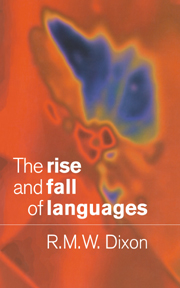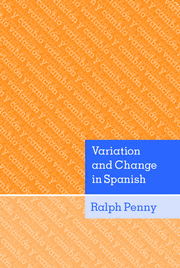The Rise and Fall of Languages
£39.99
- Author: R. M. W. Dixon, La Trobe University, Victoria
- Date Published: December 1997
- availability: Available
- format: Paperback
- isbn: 9780521626545
£
39.99
Paperback
Looking for an inspection copy?
This title is not currently available on inspection
-
This book puts forward a different approach to language change, the punctuated equilibrium model. This is based on the premise that during most of the 100,000 or more years that humans have had language, states of equilibrium have existed during which linguistic features diffused across the languages in a given area so that they gradually converged on a common prototype. From time to time, the state of equilibrium would be punctuated, with expansion and split of peoples and of languages, most recently, as a result of European colonisation and the globalisation of communication which are likely to result in the extinction, within the next hundred years, of 90% of the languages currently spoken. Professor Dixon suggests that every linguist should assume a responsibility for documenting some of these languages before they disappear.
Read more- Contributes to the 'language evolution' debate, with an alternative model for long-term language change, the punctuated equilibrium model
- Challenges speculation concerning the reconstruction of the 'proto-languages' of humankind
- Points to the limited usefulness of the 'family tree' model and 'comparative method' of reconstruction in historical linguistics
Reviews & endorsements
'I recommend this publication be read by all linguists no matter what their field of interests or specialization are. D's style is witty and to the point, but more relevantly, his previous achievements qualify him to serve as the ideal spokesman on these most significant and sensitive issues, as linguistics enters the new millennium.' Alan S. Kaye, California State University, Fullerton
See more reviews'It is a work which anyone interested in the prehistory of languages will wish to read. I predict that it will have a significant and healthy influence upon the development of research in this area and in historical linguistics as a whole.' Cambridge Archaeological Journal
'Certainly the most refreshing and stimulating work in the field of historical linguistics I have had the pleasure of reading.' Colin Renfrew, Cambridge Archaeology
'Ground-breaking work in the true sense of the term.' Robert Orr, Diachronica
Customer reviews
Not yet reviewed
Be the first to review
Review was not posted due to profanity
×Product details
- Date Published: December 1997
- format: Paperback
- isbn: 9780521626545
- length: 176 pages
- dimensions: 199 x 129 x 19 mm
- weight: 0.22kg
- availability: Available
Table of Contents
Acknowledgements
1. Introduction
2. Preliminaries
3. Linguistic Areas and Diffusion
4. The Family Tree Model
5. Modes of change
6. The Punctuated Equilibrium Model
7. More on proto-languages
8. Recent history
9. Today's priorities
10. Summary and prospects
Appendix - where the comparative method discovery procedure fails
References
Index.
Sorry, this resource is locked
Please register or sign in to request access. If you are having problems accessing these resources please email [email protected]
Register Sign in» Proceed
You are now leaving the Cambridge University Press website. Your eBook purchase and download will be completed by our partner www.ebooks.com. Please see the permission section of the www.ebooks.com catalogue page for details of the print & copy limits on our eBooks.
Continue ×Are you sure you want to delete your account?
This cannot be undone.
Thank you for your feedback which will help us improve our service.
If you requested a response, we will make sure to get back to you shortly.
×
















